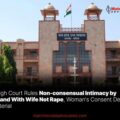
The Court acquitted a man who was convicted for causing death of his wife by inserting his hand up the rectum of his wife.
The Chhattisgarh High Court recently ruled that a husband cannot be prosecuted for rape under Section 375 or for an unnatural offense under Section 377 of the Indian Penal Code (IPC) for engaging in non-consensual anal sex or any other forced sexual act with his adult wife [Gorakhnath Sharma v. State of Chhattisgarh].
Justice Narendra Kumar Vyas cited Exception 2 to Section 375 of the IPC, which exempts a man from rape charges for sexual acts with his wife, provided she is not below 15 years of age.
“From perusal of Section 375, 376 and 377 IPC it is quite vivid that in view of amended definition of Section 375 IPC, offence under Section 377 IPC between husband and wife has no place and, as such rape cannot be made out. It is pertinent to mention here that in the amendment in Section 375 IPC in the year 2013, Exception- 2 has been provided which speaks that sexual intercourse or sexual acts by a man with his own wife is not a rape and therefore if any unnatural sex as defined under section 377 is committed by the husband with his wife, then it can also not be treated to be an offence,” the Court held.
Based on this reasoning, the Court acquitted a man who had been convicted of rape, an unnatural offense, and causing his wife’s death due to his act of inserting his hand into her rectum.
Background
The accused, Gorakhnath Sharma, was alleged to have inserted his hand into his wife’s anus.
Following the incident, she experienced severe pain and was hospitalized, where she later succumbed to her injuries.
Before her death, in her dying declaration, she stated that her illness was caused by the unnatural sexual act committed by her husband.
Consequently, the husband was charged under Section 375 (rape), Section 377 (unnatural offense), and Section 304 (causing death by negligence) of the Indian Penal Code.
The post-mortem examination determined the cause of death to be peritonitis and rectal perforation.
Some witnesses later turned hostile, and the Executive Magistrate who recorded the deceased’s dying declaration testified in court that, although she mentioned her husband’s forceful unnatural sexual act, this detail was omitted from the official declaration.
After assessing the evidence and considering the dying declaration, the trial court convicted Sharma under Sections 375, 377, and 304 of the IPC, sentencing him to ten years in prison.
This verdict was later challenged in an appeal before the High Court.
High Court ruling
The defense counsel argued that the conviction was primarily based on the dying declaration, the credibility of which was questionable. It was further contended that the trial court had disregarded the statements of two witnesses who testified that the victim had been suffering from piles since her first delivery, often leading to anal bleeding and abdominal pain.
Conversely, the State’s counsel opposed the appeal, maintaining that the trial court had correctly convicted the accused based on the available evidence and that no intervention was necessary.
After reviewing the arguments and evidence, the Court examined Sections 375 and 377 of the IPC.
The Court noted that under Section 375, rape includes the penetration of a penis into any part of a woman’s body, such as the vagina, urethra, or anus. However, it emphasized that such acts between a husband and wife, even if non-consensual, do not amount to rape due to the explicit exemption under Exception 2.
The High Court stated, “It is evident that the definition of rape under Section 375 includes the penetration of a penis into a woman’s vagina, urethra, or anus, regardless of consent. Therefore, unnatural sex between a husband and wife cannot be classified as an unnatural offense under Section 377. This creates an apparent contradiction between the provisions of Section 375 and the concept of an unnatural offense under Section 377.”
Therefore, if such an act is not deemed an offense under Section 375, it likewise cannot be classified as an offense under Section 377 of the IPC.
“If the age of wife is not below age of 15 years then any sexual intercourse or sexual act by the husband with her wife cannot be termed as rape under the circumstances, as such absence of consent of wife for unnatural act loses its importance, therefore, this Court is of the considered opinion that the offence under Section 376 and 377 of the IPC against the appellant is not made out,” the Court underscored.
The Court noted that the dying declaration was not supported by any corroborating evidence.
“The careful scrutiny of the dying declaration by this Court itself the same cannot be found to be sufficient for recording of the conviction as there is no corroboration from other evidence, as such there is doubt over the correctness of the dying declaration,” the judgment stated.
With respect to the conviction under Section 304 of the IPC, the High Court observed that the trial court had not provided any specific findings to justify its application in this case.
Consequently, the Court ruled that the conviction under Section 304 was flawed and legally unsustainable.
Based on these observations, the appeal was upheld, and Sharma was acquitted of all charges.





